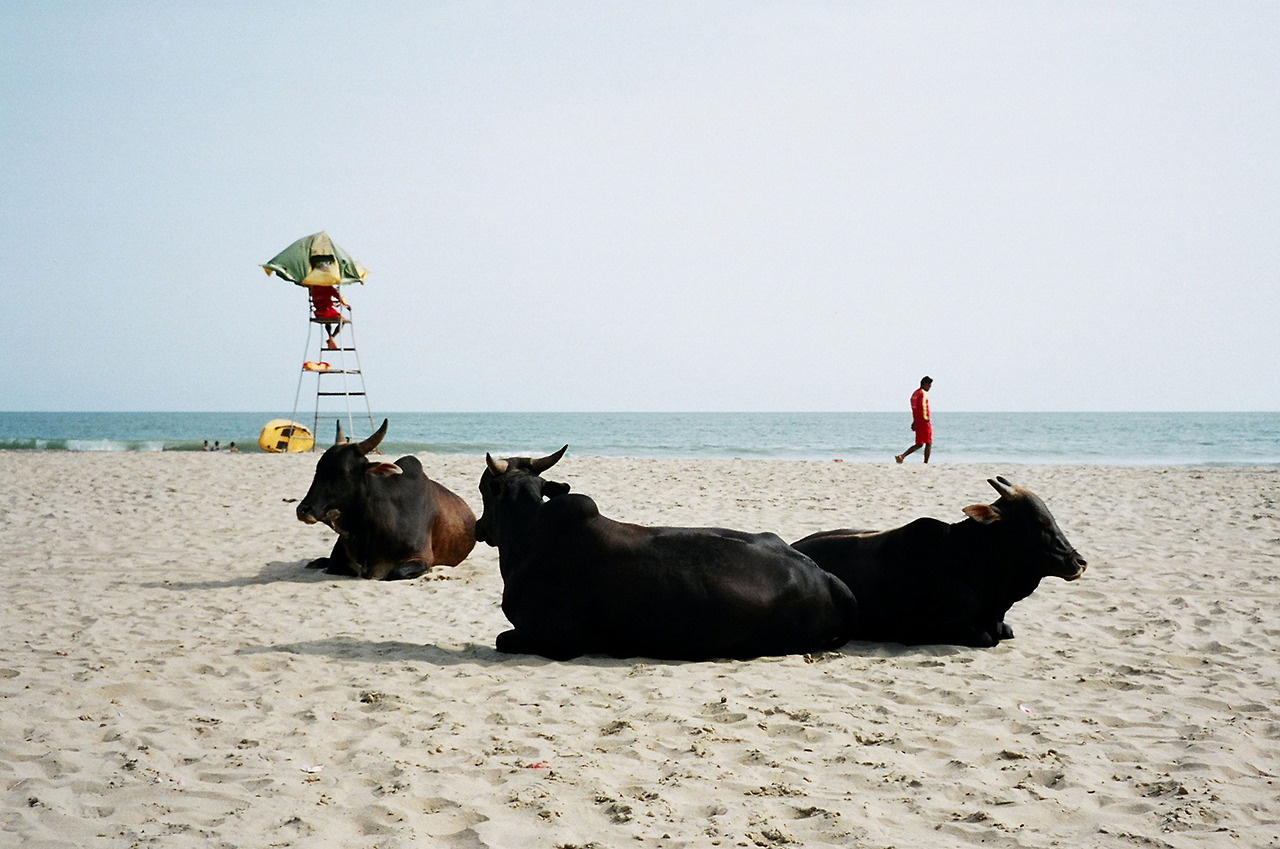Centre of Gravity talk, May 28, 2013
Heavy
Last week someone made a comment that was cleverly disguised as a question. Can you remember? The question was: why don’t we call the Buddha, Gotama? This is his last name, his family name, Gotama. I wonder if we might be able to try that out, if we could make this place, this room, a Gotama zone, for say the next hour or so. Could we try it together and see how that feels? In place of, for instance, the heaviness of the Buddha. I’ve been wondering how it would feel if you woke up one morning and all of your friends put the word “the” in front of your name. Oh, here comes the Elaine. Oh that’s exactly the kind of thing the Rose would say. It’s a bit, heavy, isn’t it?
And at the same time the underlying practice, the floorboard practice, the wallpaper practice, the practice that lies underneath all the other practices, is to see the people around you, the trees around you, the animals around you, as a Buddha. I think in the eightfold path this is called appropriate seeing. How do I see someone as a Buddha? With some people it can be so hard, sometimes we make it so hard for other people to see us as a Buddha. I know you’re in there somewhere. Whereas you look across the room at others and their whole face is like a spotlight.
Dancing Queen
Do you know this woman on Dufferin, north of Queen? She works as a crossing guard there. Do you know what a crossing guard is? It’s someone who waits with you when the light is red, and when the light turns green they walk out into the middle of the road and make sure the cars stop. Over and over and over again. Have you ever had a deep conversation with a traffic guard in your life? Crossing the same street, on the same street corner, back and forth all day. But instead of being bored, or wearing a look on her face like: why me? Why do I have to do this and for no money, strictly volunteering? She has a little music machine even though she’s… let me guess, past fifty, past sixty, past the age of visibility. You know you hit a certain age in this city and you just vanish, teenagers just walk right through you like air, dogs pee on you by accident, this is the age of this Buddha. She’s reached an invisible age but no one’s told her, so she’s out there on the corner and listening to her music machine and she’s dancing and singing a little bit of this and that, and everyone around her, the kids, the parents, the pedestrians strolling by, get infected by her happiness. You can’t help it, even when she’s listening to you know classic rock, all you can do is smile and say: I guess the Buddha is listening to classic rock today. And in that moment when she’s smiling and dancing and singing you find yourself dropping that important thing you’ve been carrying around all day, you know the big decision the family inheritance, the loops of self blame and self inflation, you just drop it, and it makes you feel so light. As soon as you can drop it you can meet her there, you can meet her here, in this moment. You’ve been ennobled by her truth. You’ve become her dance partner. In other words: you’ve let her turn you back into a Buddha.
Jesus
One of the things we’ve been exploring in the past few weeks, is the way Gotama brought religion, the religious practices of his time, back into this world, back into this city. He turns transcendence into ethics and he does it by plunging into his time, by being fully part of his time. You know, I grew up as a Christian, small c, and in the bible the gospels talk a lot about the life of this person named Jesus. This is how Jesus was born, this is how Jesus went into the temples when he was upset about the moneychangers. This is how Jesus gathered his disciples. There’s a lot of information about the life of this person, as if there was no way to understand his teaching without understanding his life. As if the material of his life mattered. Jesus didn’t live a long time, he was only thirty three when he died, and his teaching, his ministry, lasted only three years. Gotama, on the other hand, lived a long life, and he taught for decades. That’s why the Pali Canon, this collection of his texts, is so large.
So one of the first things you notice about the bible if you read it in a serious way, the first thing you notice is that the stories repeat, except they’re completely different the second time round. Like the creation story, it actually happens twice, there’s Adam and Eve and there’s Adam and Eve again, only the second time she’s born out of his rib, she’s just a piece of him. You can imagine that it probably wasn’t a woman that would have added that detail a few centuries later. Scholarship tells us that the texts were written at different times and then sewn together, collaged together. Anyone who reads the bible seriously knows right away that the one voice is made up of many voices. You can hear the quality of those voices singing together to create this text called the bible.
Castle
So anyway, this kind of reminds of Gotama, the first story I ever heard about Gotama. Maybe you’ve heard it yourself. Gotama it turns out is a prince, and like any prince, he lives in a castle, a large castle compound and part of the point of this castle is to keep the outside world far away. The unwanted noise, the bad influences, that’s all kept outside the castle walls. Have you ever had an apartment like that, have you ever lived a life like that, trying to keep the shadows from touching you? Every time the prince gets restless they offer him another delirious pleasure until one day he whispers to his favourite charioteer, let’s go check out what’s happening on the outside. What does Gotama encounter when he leaves the castle, that perfect and guarded place of home? He comes across the four sights. Before the four ennobling truths, the four sights. He sees an old man. This is how the story goes: for the first time in his life, he sees someone who is old, in other words he sees aging itself. One of the great things about being around kids is that you can be fifteen or fifty, they don’t really care. You bring with you a certain energy, a certain kind of vedana, a feeling tone, you’re meeting them here, like the dancing traffic guard, you’re here and they’re here, and off you go. They don’t see how old you are, they see you energetically. In yoga they call this the subtle body. That’s what kids feel all the time, right? That’s what the traffic guard is waking up with her dancing, that’s what people in this room are waking up to when they come here to practice yoga, right? The subtle body, the body that’s in your body, that is your body. But for a moment Gotama is thrown out of his old perceptions, and he doesn’t see someone as a subtle body with all those energies flowing, he sees an old man. And it hurts him. And then he sees a sick man. It seems strange even to say the words out loud. How had they managed to keep the sight of sick people away from him? Do you remember the first time you saw your mother or your father sick? The indomitable ones, the pillars of the world, laid low and merely mortal. He sees the sick person and he can feel how fragile this is, your sickness could be my sickness, I might be the lying in your hospital bed. Gotama sees an old man, a sick man, and then a body lying by the side of the road unmoving, and when he moves closer to examine it, he sees that it’s a dead man. Oh you mean this doesn’t go on and on, forever and ever. You mean this is going to end. It’s actually a very ordinary story, isn’t it? There will come a moment in your life, perhaps it’s already come, when someone close to you dies. When you taste death, when death touches you, and it’s not something you read about in a book, it’s not a bunch of words coming out of someone else’s mouth. It’s a taste and it’s deep in your mouth, you can taste it at the very root of the palette where the beginnings of language are coiled. And then you have this unwanted gift, maybe it’s already happened, I hope it hasn’t already happened – and the gift is: that you can look out the window from the dying place. You can see people dying right in front of you. It’s what they don’t tell you in the storybooks because it’s too cruel, it’s too hard to bear. You don’t die once or twice, most people die so many times, spend so much of their life crouched inside the castle, and they’re dying in there, in that dusty place. Gotama sees an old man, a sick man, and then a body lying beside the road. And still they plunge on, Gotama and the charioteer, further into the city, where they encounter a man in a beaten up robe and a shaved head. It’s a monk. What’s that? he asks his charioteer. That’s a monk, an ascetic, a man who had given up everything so that he can help the aging, the sick, the dying. When the prince comes back dad freaks out, but the prince is unmoved, and later that night he shaves his head and leaves the castle forever.
Does that sound familiar to you? It’s a beautiful story. In fact Gotama himself told that story, it’s in the Pali canon, and he tells it about Vipassi, another Buddha from the past. It was a story that was widely circulated in Gotama’s time, he is only one of its retellers. Strangely or not, when Gotama’s words were turned into an ism, they started telling it as if it was his story. As if he had been that prince, living in that castle.
Home
Gotama’s father was not a king, but a Gotama, a nobleman from the Gotama clan. His mother died soon after giving birth to him. A heavy thing to bear, and then his father, Gotama senior, marries her sister Pajapati. Oh she looks just the same, but it’s not the same at all. Your mother dies, after giving birth to you, and then she’s replaced by someone that looks like her, but isn’t her at all. He is born in Sakiya, a land of farmers. They cultivate rice, millet, mustard seed, lentils, sugarcane. There are animals: cows and sheep and goats. Who looks after the animals and works the fields? Peasants and slaves, not the noble family, not the Gotamas. That work is for other people. His little town is located on a crucial trading road, and along that road travels not only goods but stories, ideas, culture. Gotama would have travelled this road with his father. It’s not known for sure yet, scholars are still working it out, but it’s very likely he went to university in what is now Pakistan. Stephen Batchelor: “Young men from the newly emerging cities of North India were sent there to train in the arts of government and war, to become doctors and surgeons, to study religion and philosophy, or to master magic and ritual.” We don’t know for sure what he was doing. He comes back home, he gets married to a woman named Bhaddakaccana (or possibly Bimba), and at the rather late age of twenty-seven, when he’s twenty-seven she gives birth to a son. They name him Rahula (a popular Indian name). Shortly after his son is born, he decides to leave home. This is what he says about it. “Though my mother and father wished otherwise and wept with tearful faces, I shaved off my hair and beard, put on the yellow robe, and went forth from the home life into homelessness.”
You mean he left his wife and his newborn son? The mother who was his second mother. The father who hoped for better things. His education, his friends and familiars. The habit pattern is to project my world into that world of the past. My values, my understandings take a new turn in that world. But customs are very different, you know. For instance, there was a period in the middle ages in Europe, when if you died, the best thing for you, the most ideal thing for you, would be to be buried as close to the church as possible. The church, the centre of the God place. It wasn’t important that you had a particular marking, that someone knew oh this is exactly where you are buried. They heaped skeletons in a jumble one on top of another. What was important, the only thing that was important was to have the remains lie close to the altar. Today we bury people as if we were buying them real estate, it’s a last transaction, a last house. This is Joe’s last house, he’s buried right here. But this is a relatively new, culturally encoded idea about what we should do with a body after death. In India, of course, corpses are still burned in public. It’s a different set of conditions, as Gotama might put it, so his leaving his wife and son, it’s hard to know what to say about it. But I’d like to say something about leaving home.
Jes
Do many of you know Jes Markoff? She’s a thirty year old yoga instructor/massage therapist/teacher. She’s been coming to Gravity for a few years now. And she had this… feeling, she had this… intuition, that she had to do something. Do you ever get them? These nudges. And if you do, do you know how to listen to them? Or have you learned, like me, only to listen to the urges that suit the life you already know? The fears you’ve already welcomed as your home. So Jes has this hunch, and the hunch says: you have to leave home. Meaning: you have to leave everything behind. Do you know that she’s been coming here every Tuesday, but that when the session is over, she doesn’t have a home? She has people who let her stay in her basement, day to day, it’s all provisional. I met up with her last weekend and she’s carrying this enormously heavy bag with all this gear in it, all of her stuff, and the rest of her stuff is in her car. She’s staying with friends and family and here and there. She’s improvising, she’s making it up one day at a time. And now she’s on the road, and she doesn’t know where she’s going exactly, because that’s what things are like once you’ve left home.
I wanted to mention this because some events in Gotama’s life can feel so far away, and then all of a sudden they’re happening to someone you know, or someone you sit beside every Tuesday night. And as soon as you can lean over and hear it, as soon as I can drop the heavy important anchor of my important thoughts, my to-do lists, and all the things that I am imagining are my home, as soon as I can leave home, I find her turning me into a Buddha, just like that, with all of the new space she has in her life, with all of her new tears, all of those new hopes.
So Gotama leaves home, he walks along the trade road. According to Stephen Batchelor, and other luminaries, these are the possessions he has, pretty much for the rest of his life: a metal or clay bowl, a needle and thread, a razor, a water strainer and if he were unwell, some medicine. When it rains he gets wet. When it’s cold out, he’s cold. There’s no jacket, no blanket, no bed. When it’s hot out, he gets hot. He’s part of the conditions that surround him, he’s changing with the weather, he’s becoming the weather. And maybe that’s not as romantic as that sounds. But in Gotama’s time there was a place in society for people who wanted to shave their heads and wear robes and drop out. Or were they dropping in? Unlike today in Toronto, where some of the people who have dropped out, who have lost their homes, who are sleeping on grates downtown or near city hall for safety, they’ve become a kind of invisible class, at the very least: an unwanted class of people, they are the ones who don’t belong. But Gotama joins a class of people who are recognized, they have a job without a job, an occupation of mindfulness, they have a place.
I promised Michael I would say something about the four ennobling truths and it’s already so late, so let’s rush forward. Gotama spends six years in search, he does yoga, which at that time means concentration practice. He starves himself, he talks about how thin he becomes, and his comrades are doing the same things. They are very serious in their pursuit of the truth. Perhaps they were haunted by this beautiful question: what is this?
Trees
Trees are a very important part of Gotama’s life. As a young child he has his first experience of meditation underneath a tree, it is a crucial turning point for the dharma, because as he fearlessly unravels this moment later on, he realizes that one can have pleasure without craving. And that the pleasure arrives by being here, in this moment. It is significant that his father is close by, but not telling him what to do, not ordering his experience. His security is close by but not domineering, and so he relaxes into spontaneous meditation. You have to remember this is before cell phones or Youtube, Gotama had to rely on older technologies not yet transformed by Mr. Gates, and his meditation brings him pleasure. Have you ever felt pleasure while you’ve been sitting underneath a tree? The light through the leaves, the easy shade, the years of growth and solidity. Gotama remembers that childhood tree and realizes that the path that he needs to cultivate, is not about turning away from this world. It’s not about seeing this world as evil or sinful or filled with meaningless distractions, or that this world is some kind of collective delusion. This is what they tell you in art school: you have to love the material. You have to love the canvas and the paint, the bronze and the solder, the light on his face, the way that dog rubs its head against your knee while you’re walking. Do you love the material you’ve made your own life out of, the way it touches you unexpectedly?
Frustrated in his searching – and what invention is not born out of this wonderful horrible state, this generative, fruitful, inspirational state we name as frustration (why invent if we were never frustrated) – Gotama finds, what else but a tree, and sits beneath it, and sets an intention: that he’s going to sit there until he cracks the code. On the third day he cracks the code and he awakens, he compares himself to someone waking from sleep in the morning, starting awake, suddenly here in this new world, all here. There follows a short and mysterious period of a few days, and then he meets his fellow travellers again, but they notice right away that something has changed about their old friend. Gotama sits down with them and delivers the first sutta, the first talk he ever gives. And the subject of that first and very important talk, is of course his attempt to answer their question: what happened to you? What is this thing you’re calling awakening?
Awake
What he awakens to is something called conditioned arising. Arising, like a wave coming up onto shore, like a current of air running into a room. It arises. And it has certain qualities, is the wave large or small, is the water in the wave cold or hot? These qualities are called conditions. Conditioned arising. The wave comes and it is made up of conditions. Gotama sits underneath the tree, and he is perfectly still, this is the key point, he doesn’t want to change the way things are, he doesn’t want to add anything to colour the moment, he wants to receive this instant, this instant, this instant, just the way it is. In other words, he stops feeling the conditions arising of this moment, the heat in this room, the strain in this knee ligament, the heat of the stare of the person sitting behind me, he stops feeling that these conditions belong to him. They’re just patterns of sensations, rising and falling, rising and passing away. And he knows in that moment that everything around him is only made of conditions, these always shifting conditions. This is Gotama’s awakening. There is an ego, but not-a-self, everything is part of everything else. On the one hand emptiness, on the other hand interdependence.
And then what? What is there to be said about that? This is what stumps Gotama, maybe, for a few days. He asks himself this question: how can I translate this experience of stopping, stopping the habit pattern of turning all experience into something that was designed for me. Fundamental premise of the self. It sounds crazy when you say it out loud, but it’s the way all sane people operate. Everything that happens in the universe has been designed only so that I can experience it. This room was built so that I could walk in here. Hey, that’s nothing, they built this whole city for me. Have you seen it, that’s my city. That’s why I get mad when the stoplight is red for too long. you know, my stoplight. My stoplight is red for too long. Hey, you’re standing in my line. This is my line in my grocery store. This fundamental premise of the self, is a separation, it separates me from you, and that makes me so special, I’m so special, it puffs me up, it inflates me, because actually, most of the time, I feel so tiny, I feel deflated, omigod, look at all this. And this process of inflation and deflation, this fundamental separation that creates the self, is the wound that Gotama is trying to address. The delusion of separation – that shows up as grasping, me, myself, mine – this is what Gotama is trying to heal.
He’s a practical guy. It’s really important to remember how practical Gotama was. Most often his teachings are in the form of dialogues. Chit chats, question and answer periods. He’s usually addressing specific people in specific situations. So in this first rap, he’s back with his shaved head pals, and they’ve tried so hard to understand. And what he wants to talk to them about is: how do you turn this insight about conditioned arising, that all this life is is conditioned arising and passing away, arising and passing away, how do you turn that realization into a practice? How do you translate that into a way of life? The whole of the dharma, the endless pages of the Pali canon, is taken up with this question. How do you translate this awakening into your life? How does it become a model for living a different kind of life? What he offers his pals is a simple and complex teaching which has come to be known as the four ennobling truths. Because if you can feel them, if you can perform them, they make you noble.
Open Air
Here is Gotama in his own words: “As long as my knowledge and vision were not entirely clear about the twelve aspects of these four ennobling truths, I did not claim to have had a peerless awakening…” This is how he puts it, if I didn’t experience the twelve aspects, no awakening. Or to say it from the other side, what is your awakening? These twelve aspects. Because each ennobling truth is to be recognized, performed, accomplished. In other words they are tasks to be performed. Over and over again Gotama takes received opinions, stuck situations and inheritances that are fixed and solid and he puts them into motion. It’s interesting that so many of the qualities that are obstacles, that are fixed and solid, he calls these: home. Qualities in us, perhaps qualities in himself, that are unmoving, that are stuck: he calls these home. And then he says it’s necessary to leave home. That practice means leaving home. To leave certainty behind, moving away from a fixed place to a fluid ground where you’re porous, and part of what is around you, where conditions might arise and pass away, and move through you. He calls it “an open air life.” An open air life. I wonder if Jes Markoff is living “an open air life” this evening. In Gotama’s time people left home, it was not an uncommon practice, but today we might take this more metaphorically. We might leave the fixed ideas we have about ourselves, or the good old fashioned ways we like to punish ourselves, or the ways we like to keep ourselves small and contained. I’m so small you won’t ever be able to find me again. You’ll never be able to hurt me again. Did you know that Steve Jobs invented a yoga pose? It’s called laptopasana. it requires the prop of the laptop computer but let me demonstrate it for you. It’s a pose that makes us small, and it’s a pose that hides our hearts, as if our hearts needed to be protected from something. From the slings and arrows of Facebook, I don’t know. And this pose, this aponic pose, becomes a new kind of home. Our shrinking, small and certain place of home.
Leave Home
Gotama urges us to leave home. How do we leave home? He offers us these four ennobling truths. Four specific actions. This is the way we leave home. What are these actions? The first truth is to be fully known and embraced. The second truth is about letting go. The third truth is about experiencing this stopping, this stillness that we spoke about, that Gotama experienced under the tree, to experience that for yourself. I think this has something to do with pleasure, when you experience this stopping for yourself, it’s often accompanied by a feeling of deep pleasure, and it is a pleasure that doesn’t belong to you, but belongs to this moment. And the fourth task is the cultivation of a path. Has anyone ever followed a path in a forest? There’s a thicket of forest on either side and between the two sides there’s a clearing. How is the clearing made? In part, the clearing is made by walking the path. What if no one walked that path in the forest anymore? What would happen to the path? It would grow over right? It would stop being a path. Cultivating the path, the fourth truth, means: walking the path. Because if you don’t walk it, the path just grows over. And this path leads us away from home, from what we think we know about ourselves, and about this moment that hasn’t happened yet.
We’ve just about arrived at the place where the talk should have started, so perhaps I can stop soon and let you fill in the rest. But I just wanted to say a couple of sentences about the first ennobling truth: to fully know dukkha. In an Australian lecture dished a couple of years back, Stephen Batchelor translates the first ennobling truth like this: to fully know that shit happens. What do we usually do when shit happens? Check email, binge on Netflix, eat ice cream, call a friend. Gabor Mate says that we are a society of addicts, that we are all addicted, to telling certain kinds of stories about ourselves, to overworking, to television, to the repetition of old family riffs. Craving is not the cause of dukkha, but the result. It’s our habitual response to lack. It is so difficult, when feeling aversion, not to bring one of our addictions forward. It happens so fast, like a reflex. Usually aversion, the feeling of aversion, makes us turn away, this is the habit pattern. What would your practice look like, as a writer, as a painter, as a father or a mother, as a yoga teacher or a veterinarian or a counselor, what would your practice look like if every time you felt something negative you simply stopped and shut down? What kind of a parent would you be to yourself?
Hug
The first ennobling truth says: put down the ice cream and walk towards the bad feeling. This is what it means to leave home: to stagger forward, to stumble along, with your eyes wide open looking at the unbearable thing, to fully know, these are the words that Gautama uses, to embrace. To hug your bad feelings, to give them a place, to allow them inside even inside the laptopasana, and let them touch you. And then you can start to feel that these bad feelings don’t just belong to you, they are also inside the person who is giving you these bad feelings. A great compassion might start to build, as you can feel that these forces are not strictly personal, and this is the second ennobling truth, that there is a cause of these bad feelings, and you feel your way towards the cause through the hug of these bad feelings, that allows you to hug others, that gives rise to compassion, as you see others struggling to remain princes and princesses inside their castles, struggling to keep the darkness outside, trying to build their walls a little higher, the moats a little deeper. But as you can taste death in the back of your throat, as you can look out the windows of the dying place, you can see how impermanent those castle walls are, you can already see them fading away. How to fully embrace this moment, even if it’s a difficult moment, especially if it’s a difficult moment? How to leave home?







